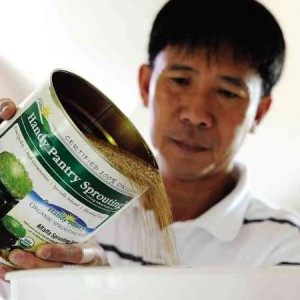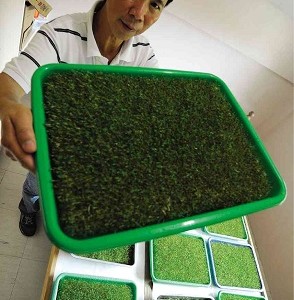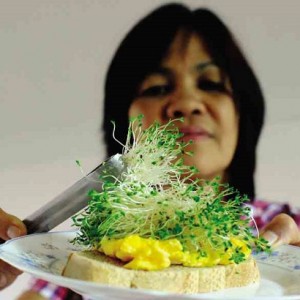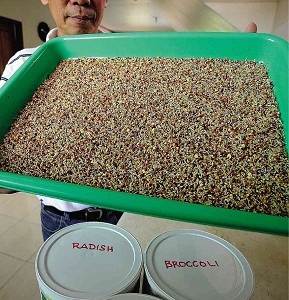Former overseas worker finds new career in organic food

BAGUIO-BASED Mauricio Sandico invests his retirement money from an overseas job in a La Union farm. He and wife Fely are the main distributors of alfalfa sprouts in Baguio City. PHOTO BY EV ESPIRITU/ INQUIRER NORTHERN LUZON
BAGUIO CITY—After 24 years as an overseas worker in the Middle East, Mauricio Sandico returned home to explore business opportunities and ended up choosing a venture close to an advocacy he shares with his wife, Fely—organic and healthy food.
Shortly after retiring in April 2007, Sandico says he and Fely invested in a farm land where they could specialize in cultivating organic crops because they have championed healthy eating all their lives.
“[Buying] land is still one of the wisest investments because it is permanent,” says the 57-year-old Sandico.
The couple bought a 4.4-hectare farm for P3.8 million in Rosario, La Union, just an hour’s drive from Baguio, after failing to find a suitable farm land here or in neighboring La Trinidad, Benguet.
The Sandicos lost no time in gradually transforming their newly acquired property—a former tobacco and corn farm—into an organic hub.
Sandico contacted the La Trinidad Organic Practitioners Multipurpose Cooperative (LaTop), an influential group of organic producers in La Trinidad and Baguio. In late 2007, he took a basic course in organic farming given by LaTop.
They began shipping sunflower stems from Baguio to their Rosario lot, which they shredded and mixed with weed and grass for compost.
They have since cultivated organic rice—both inbred varieties from the Philippine Rice Research Institute (PhilRice) and some heirloom upland varieties from the Cordillera such as “balatinaw” (a violet rice)—in some areas of the farm. Some of the farm space have been devoted to lowland vegetables—okra, eggplant, bitter gourd, tomatoes, string beans and almost any other vegetable found in the “Bahay Kubo” children’s song.
In between or around the perimeter of the crops, they planted lemongrass and marigold to ward off pests and insects.
“But eventually I maintained only the lemongrass, which we can also sell,” says Sandico.
Aside from farming, the Sandicos wanted to explore other related ventures that they could engage in while at home in Baguio waiting for their crops in La Union to be harvested.
Sandico discovered that among the more than 200 members of LaTop, only former LaTop president Pat Acosta tends and sells alfalfa sprouts at the local market.
Alfalfa sprouts are popular salad ingredients, which are rich in iron, magnesium and vitamins.
Alfalfa seeds are much like sesame seeds, which are almost as tiny as pechay or cabbage seeds. Week-old alfalfa sprouts, he says, are about 10 times smaller than monggo sprouts.
Health experts say alfalfa sprouts are antioxidants (or have anti-cancer substances).
Acosta’s alfalfa sprouts are patronized by the Baguio branch of a pizza restaurant chain, as well as by restaurants at Camp John Hay.
But Sandico notes that Acosta’s alfalfa sprouts could not meet the growing demand, so he decided to join that niche market in 2011.
Sandico says he was fortunate to have a brother in the United States, where he orders alfalfa seeds, which are certified organic by the US Department of Agriculture. His brother sends the items by courier.
Sandico then had to embrace the fact that he needed to discover for himself how to grow sprouts in Baguio weather.
“There are minute details [in growing alfalfa sprouts] which I myself had to discover, so I had to experiment,” Sandico says.
For example, Sandico says he learned that too much chlorine in tap water did not help germinate the sprouts. “We had to invest on a water purifier,” he says.
“It took three months of experimentation before I came out with the perfect sprouts following trials that destroyed a lot of seeds,” he adds.
Sprouting alfalfa turned out to be a good source of income for the Sandicos, augmenting revenues from their organic farm.
“Some neighbors would say, ‘Good for you, you can earn come rain or typhoon,’” says Fely, who delivers their alfalfa sprouts to their various outlets.
The Sandicos produce and deliver daily an average of 75 to 95 packs (each pack contains 100 grams) of ready-to-eat alfalfa sprouts to their outlets here. Fely says they earn between P4,500 and P5,700 daily.
Their outlets for alfalfa spouts include the LaTop cooperative stores at the Baguio Convention Center and in La Trinidad, the Cafe by the Ruins, the Baguio public market and the organic vegetables’ stall of Catholic nuns at the Baguio cathedral compound.
Consumers buy alfalfa sprouts for sandwiches, fresh vegetable salads and soups.
For soup or any kind of stew, Sandico says one should not cook the sprouts to preserve their nutrients. “Just put the sprouts in a bowl of ready-to-serve hot soup,” he says.
Children usually avoid vegetables, but they love alfalfa sprouts when mixed with sandwiches, “so you are assured that they are eating something which contains the vital minerals and vitamins they need,” says Fely.
With the promise of regular income, the Sandicos transformed the three-room top floor of their house into germinating beds for their alfalfa and shortly later, broccoli, radish and clover sprouts.
The Sandicos follow a six-day routine for their alfalfa sprouts. The alfalfa seeds are first soaked in purified water for eight hours, after which the seeds are placed in trays in a dark room for two days to germinate.
On the third day, the tiny sprouts contained in a tray are transferred in four trays to give more space for the now growing sprouts and would now be transferred in another room with an open screened window to allow sunlight in.
“As with any other plants, the sprouts need sunlight (which is regulated through a light curtain from the window),” says Sandico.


